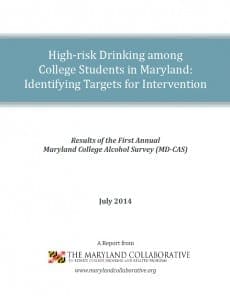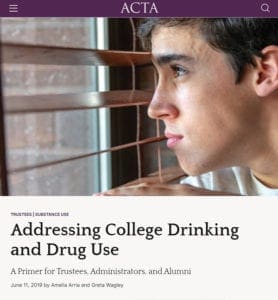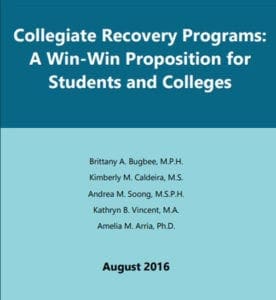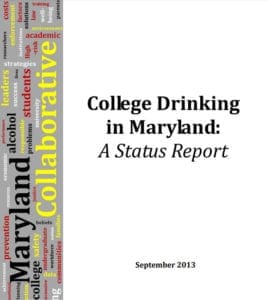Special Reports
Here you will find reports providing an in-depth look into important topics relevant to college drinking and related problems.
 Addressing College Drinking and Drug Use
Addressing College Drinking and Drug Use
A recent report by the American Council of Trustees and Alumni entitled “Addressing College Drinking and Drug Use” outlines how top-level leadership can become involved in promoting evidence-based practices. The press release from ACTA is available here.
 Collegiate Recovery Programs: A Win-Win Proposition for Students and Colleges
Collegiate Recovery Programs: A Win-Win Proposition for Students and Colleges
This report is an expansion of the fact sheet and will explain what Collegiate Recovery Programs are, their benefits and provide an overview of how some colleges are using them to support students who are in recovery from substance use disorders. Collegiate Recovery Programs: A Win-Win Proposition for Students and Colleges
 College Drinking in Maryland: A Status Report
College Drinking in Maryland: A Status Report
This report details what was learned during the first year of planning for the Maryland Collaborative. Information was gathered using a variety of methods, including discussions with community leaders, administrators, and staff from 38 schools in Maryland, and reviews and analyses of publicly-available administrative data. College Drinking in Maryland: A Status Report
High-risk Drinking among College Students in Maryland: Identifying Targets for Interventions
 This report describes the process of creating and administering the Maryland College Alcohol Survey (MD-CAS), and provides the aggregate results of the data collected from students in the first year of the survey (2014). Ten schools participated in the first annual MD-CAS; aggregate results from 4,209 students from nine of those schools are presented in this report.
This report describes the process of creating and administering the Maryland College Alcohol Survey (MD-CAS), and provides the aggregate results of the data collected from students in the first year of the survey (2014). Ten schools participated in the first annual MD-CAS; aggregate results from 4,209 students from nine of those schools are presented in this report.
The survey was designed to measure levels of alcohol use and excessive drinking, the alcohol-related consequences that drinkers experience, and the harms students experience as a result of other students’ drinking. The survey included questions on suspected risk factors for excessive drinking relating to: 1) access and availability; 2) attitudes and expectations about use of alcohol and its perceived benefits; 3) early exposure to alcohol; and 4) parental influences. Doing this permits the participating schools to quantify the contribution of these risk factors and target interventions to address salient issues.



